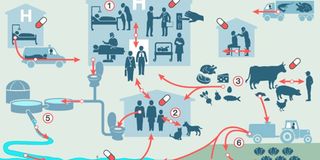How antibiotic resistance is spread

Dar es Salaam. Poultry keepers and herders have the duty to protect their customers from the perils of antibiotic resistance if they adhere to basics on how they enhance their livestock or treat them from bacterial diseases.
The general public must also be aware that their appetite for foods, like poultry products, could be the reason why they don’t get healed from common bacterial diseases that are treated by antibiotics such as streptomycin.
Experts on animal and human health warn that Tanzanians are increasingly consuming antibiotics such as streptomycin through eggs, chicken and other meat products because of poultry keepers who are wrongly using the drugs to enhance the growth of chicken and other livestock.
It is recommended that if chicken or any other livestock is put on antibiotic, a period of 14 days has to elapse before the eggs laid by the chicken or meat products taken from animals are supplied to consumers.
During this 14-day period, usually referred to as the withdrawal period, any eggs produced or meat cut from the animals still contains the antibiotics that can easily be consumed by humans, alongside the animal products.
In a book: Wicked Health Problems and the One Health Approach in Tanzania; which was launched on Thursday at Muhimbili University of Health and Allied Sciences, Prof Japhet Killewo explains why regulatory authorities in Tanzania must work with agricultural experts to help livestock keepers understand the risk of overusing or misusing antibiotics.
“Common diseases, such as cholera and tuberculosis, are increasingly becoming difficult to treat with antibiotics, yet we are likely to see more of these epidemics in future because the drugs that should have treated them are being rendered ineffective,” he warned.
“On the other hand, livestock keepers don’t adhere to the withdrawal periods because they believe this might have an impact on their economic livelihoods in cases where they are required to throw away the products such as eggs,’’ he sad.
An expert in veterinary medicine from Sokoine University of Agriculture, Prof Robinson Mdegela said that the antibiotic Streptomycin, is largely used by livestock keepers to achieve better animal yields but in the end, they are promoting antibiotic resistance, thus making certain diseases untreatable by the same drugs.
He said Streptomycin, which is also used in combination with penicillin for treatment of tuberculosis in humans, has been rendered ineffective because it has been unknowingly overused by livestock keepers who are using it to treat their sick livestock of animal diseases.
The drug, he said, is also being used by livestock keepers to enhance growth of chicken but there are no tight controls to force the livestock keepers adhere to standards of ensuring that the drugs are used in animals correctly, especially on adhering to the withdrawal period.
“In hospitals, the antibiotics like Streptomycin are highly controlled. This is because of the fear that if they are overused or used irrationally, they might become resistant.
“But with the livestock keepers, there no tight controls. Livestock keepers who have no knowledge of prescription are giving the antibiotics to animals without following standards,” says Prof Mdegela.




